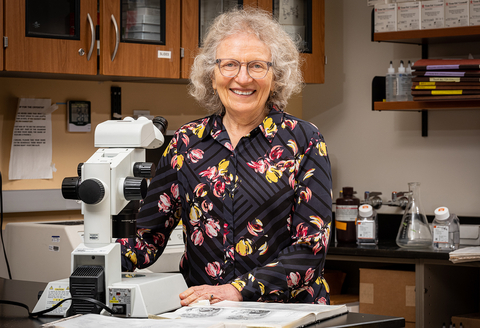Dr. Betty Diamond and colleagues receive the Global Team Science Award to study the body’s recovery from lupus in diverse patient populations
Millions worldwide and an estimated 200,000 people in the United States have lupus, of whom 90 percent are women. In an effort to translate basic molecular research into better therapy for patients seeking care, The Feinstein Institutes for Medical Research has been awarded a $3 million Global Team Science Award from the Lupus Research Alliance. Betty Diamond, MD, director of the Institute of Molecular Medicine at the Feinstein Institutes and the Maureen and Ralph Nappi Professor of Autoimmune Diseases, will lead the research efforts as the corresponding investigator with a multi-disciplinary global team.
This press release features multimedia. View the full release here: https://www.businesswire.com/news/home/20220824005161/en/

Dr. Betty Diamond is the director of the Institute of Molecular Medicine at the Feinstein Institutes. (Credit: Feinstein Institutes)
Lupus, an autoimmune disease that affects the joints, skin and organs, often causes people to experience fatigue, brain fog, joint pain, rash and fever. There are no cures for the disease; instead, treatments are mostly focused on helping to minimize flare-ups and improve quality of life. Through the support of the award, the project led by Dr. Diamond will aim to characterize the body’s immune and brain response in small numbers of diverse people with Systemic lupus erythematosus (SLE) who are in drug-free remission. Obtaining this information will help paint a better picture of the cells/pathways involved in SLE remission to inform physicians of the pathways to better health.
“Some lupus patients can experience reduced flare-ups and go into remission. It is critical to understand what is going on at a molecular level in patients who fall into this category, including patients who still exhibit neuroinflammation. We wonder if those with continuing neuroinflammation are those who will relapse,” said Dr. Diamond. “Through the generous support of the Lupus Research Alliance, we hope to develop new tools in assessing remission, identifying new signs of lupus flare-ups and novel potential drug targets.”
Using brain scans and cell analysis, researchers will help answer questions about which cells are active or inactive during remission, how the brain changes during this time, and other immune response biomarkers that can track the progression of the disease.
“As a leader in lupus research, Dr. Diamond brings an important new perspective to unlocking the mysteries of this condition,” said Kevin J. Tracey, MD, president and CEO of the Feinstein Institutes and Karches Family Distinguished Chair in Medical Research. “Supported by the Lupus Research Alliance, this new project will shed new light on how the brain is interacting with the immune system in these patients.”
In addition to Dr. Diamond, members of this global research team include:
- David Eidelberg, MD, Feinstein Institutes for Medical Research (co-principal investigator)
- Cynthia Aranow, MD, Feinstein Institutes for Medical Research
- Meggan Mackay, MD, Feinstein Institutes for Medical Research
- Hilda Fragoso-Loyo, MD, National Institute of Medical Science and Nutrition Salvador Zubirán, Universidad Nacional Autónoma de México (co-principal investigator)
- David Isenberg, MD, University College London (co-principal investigator)
- Jimmie Chun Ye, PhD, University of California, San Francisco (co-prinicipal investigator)
- Noa Schwartz, MD, Albert Einstein College of Medicine and Montefiore Medical Center
- Maureen McMahon, MD, UCLA School of Medicine
This marks the second year the Lupus Research Alliance has awarded its Global Team Science Award. Among other awardees, this year includes international teams led by corresponding investigators; Martin Kriegel, MD, PhD, Head of the Department of Translational Rheumatology and Immunology, University of Münster, Germany; and Eric Morand, MD, PhD, Head of the School of Clinical Sciences, Monash University, Australia.
Dr. Diamond is a pioneer in the basic science research of autoimmune diseases, particularly SLE. For more than four decades, Dr. Diamond has dedicated her career to the study of DNA-reactive B cells, autoantibodies and their origin and effect on the body. In May 2022, in recognition of her breakthrough achievements in molecular medicine and original research, The National Academy of Sciences elected Dr. Diamond as one of its newest members.
About the Feinstein Institutes
The Feinstein Institutes for Medical Research is the home of the research institutes of Northwell Health, the largest health care provider and private employer in New York State. Encompassing 50 research labs, 3,000 clinical research studies and 5,000 researchers and staff, the Feinstein Institutes raises the standard of medical innovation through its five institutes of behavioral science, bioelectronic medicine, cancer, health system science, and molecular medicine. We make breakthroughs in genetics, oncology, brain research, mental health, autoimmunity, and are the global scientific leader in bioelectronic medicine – a new field of science that has the potential to revolutionize medicine. For more information about how we produce knowledge to cure disease, visit http://feinstein.northwell.edu and follow us on LinkedIn
View source version on businesswire.com: https://www.businesswire.com/news/home/20220824005161/en/
Contacts
Matthew Libassi
631-793-5325
mlibassi@northwell.edu







